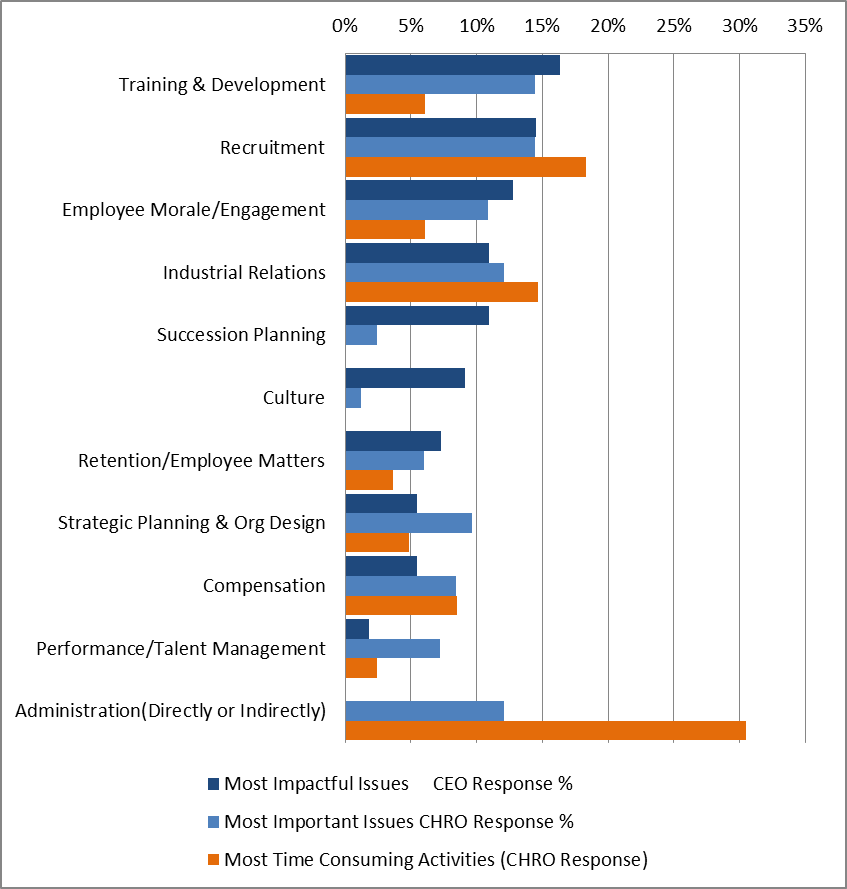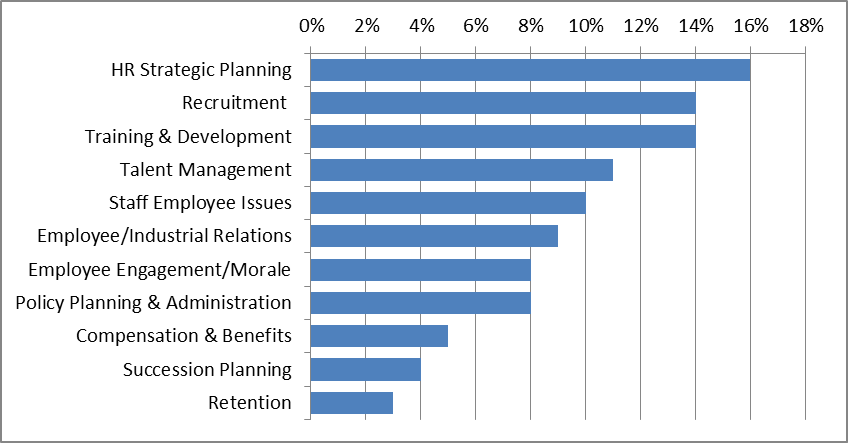 Click here to download the Newsletter (Adobe PDF)
Click here to download the Newsletter (Adobe PDF)
In this era of rapid business change, the role of Human Resources is becoming more demanding than ever.
In our recent Survey of the HR function, conducted in Trinidad and Tobago, we sent questionnaires to both CEOs and Heads of the HR function (CHROs) to review the status of the HR Function within local organisations; receiving responses from 32 CHROs and 21 CEOs *.
[* Caveat: 53 responses is indeed a very limited sample, and most of the questions were in Yes or No format. Nonetheless, certain insights could be gained from the results with respect to the state of the HR function in Trinidad and Tobago.]CEOs listed “Training & Development”, “Recruitment” and “Employee Engagement/Morale” as the 3 most impactful issues facing their companies (See Table 1), with CEOs spending 25% on average of their time on HR matters. To reinforce the point, 84% of CEOS and 79% of CHROs saw the HR Function as Strategic, and 90% of CEOs and 97% of CHROs identified the HR function as a “Value Creator” as opposed to a “Cost Centre”.
|
Most Impactful/Important HR Issues |
% Response by CEOs |
% Response by CHROs |
|
Training & Development |
16% |
15% |
|
Recruitment & Staffing |
15% |
14% |
|
Employee Morale/Engagement |
13% |
11% |
|
Industrial Relations |
11% |
12% |
|
Succession Planning |
11% |
2% |
|
Culture |
9% |
|
|
Compensation & Benefits |
5% |
8% |
|
HR Strategic Planning & OrgDesign |
5% |
10% |
|
Administration (Policies & Procedures) |
12% |
|
|
Performance Management |
2% |
7% |
Table 1. CEO Responses – Most Impactful HR Issues
|
Most time consuming Activities of HR job |
% Response by Heads of HR |
|
Recruitment |
18% |
|
Administrative Work (Directly or Indirectly) |
16% + 10% |
|
Dealing with Employee/IR matters |
15% + 4% |
|
Compensation |
9% |
|
Employee Engagement |
6% |
|
Training & Development |
6% |

In HRC Associates’ survey of Corporate Directors Compensation in 2014, approximately 52% of responding companies reported having a Human Resources Committee, while 17% reported Compensation Committees. 90% of CEOs in our recent survey consider the Head of the HR function as part of the Strategic Leadership or Executive team, with eighty-six percent (86%) of the CHROs reported directly to their CEO, and 94% of CHROs having frequent dialog with their CEO. As far as the discussions between CHROs and CEOs go, they most frequently dialogue to discuss matters relating mostly to HR Strategy, Development and Recruitment. (See Table 3)
|
HR Issues |
% Response by Heads of HR |
|
HR Strategic Planning |
16% |
|
Recruitment |
14% |
|
Training & Development |
14% |
|
Talent Management |
11% |
|
Staff Employee Issues |
10% |
|
Policy Planning & Administration |
8% |
|
Compensation & Benefits |
5% |
|
Succession Planning |
4% |
|
Retention |
3% |

Even though 70% of CEOs are generally satisfied that their Head of HR has the skills and abilities to perform their job and provide advice, 55% of CEOs are dissatisfied with the state of HR in their company. All CEOs (100%) feel that a Head of HR should have previous line or business experience; however, the vast majority of CHROs have come through the HR pipeline and lack real line experience.
Despite being trusted members of the organisation’s Executive team, only 40% of CEOs would consider their current Head of HR to be a potential candidate for the CEO role and only an alarming 9% of CHROs see themselves as future CEOs of their company; citing insufficient business experience (37%), lack of interest (52%) and ineligibility (11%) as the main reasons.
Several factors are converging that will make reinventing HR a critical priority:
- Companies are more worried about talent than ever before.
- A highly competitive market is shifting power into the hands of employees and creating a more demanding workforce.
- Changes in technology and transitioning within organisations, which require HR to take the lead in ensuring required competencies are embedded.
- Traditional HR practices, such as performance management and leadership and development are undergoing radical change, forcing HR to deliver more innovative solutions.
- Companies need strong professional development programs and research to support focused strategies.
- Globally, HR is shifting from generalists to highly skilled business advisors to deliver business results in the areas of greater customer satisfaction, operational efficiency and faster time to market.
To put it bluntly, there is an uneasy gap between what business leaders want and the capabilities of HR to deliver. Companies must now move beyond talk to action, revisiting the required capabilities of the HR function, and decide whether “It’s Time to Blow Up HR and Build Something New”; as suggested by the provocative title on the cover of Harvard Business Review’s July-August 2015 edition.
About HRC Associates
Founded in 1990, HRC Associates is a recruitment and management consulting firm specialising in human resources, compensation, executive recruitment, general management, and organisation strategy and change issues. HRC’s mission is to work with our clients to help them reach their full potential by integrating their people and organisational systems with their corporate vision and strategic intent.

